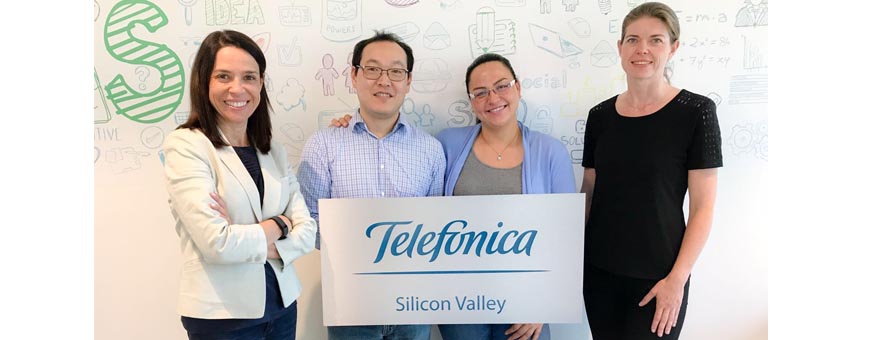 Fernando Menéndez
Fernando Menéndez
We are interviewing Guenia Gawendo, Telefónica’s Silicon Valley Director. Her mission is to: identify new trends and customer behavior in the digital world, coordinate Telefonica’s relationships with strategic Mobile Industry leaders; and identify new business opportunities, collaborations, and partnerships. Guenia has held a number of senior global positions within Telefónica including: CCDO Business Manager; Chief Operating Officer of Advertising or Head of Marketing Best Practices. She joined Telefónica after working with management consultant companies like McKinsey or BCG.
1) Now that you’re running the Silicon Valley office, tell us why Telefónica has a branch there.
Silicon Valley (SV) and the west coast of the United States form the centre of global technological innovation, it is where the large technological companies – the GAFA (Google, Apple, Facebook and Amazon) and others such as Microsoft, Salesforce, Netflix, etc. – are based. In addition, the start-up ecosystem is amazing. SV accounts for about 30% of global venture investments and New York and Boston a further 15%. Having a presence here enables us to have more direct (easier and faster) access to all this innovation. No current-day technological company which wants to succeed can turn its back on the valley.
2) What is it you do on a daily basis?
Our office is Telefónica’s “embassy” in Silicon Valley. Our purpose is to bring Telefónica closer to the Valley and the Valley closer to Telefónica. On a daily basis, we talk to start-ups, to the major technological investment funds and to other leading institutions such as Stanford, SRI and Berkeley. We’re a small team, 4 people in total, but we work and deal with scouting requests for everyone at Telefónica, in the corporate areas and in the countries. We’re also responsible for scouting in Israel, which is another important innovation hub, where we have 1 external person who cooperates with us.
“Our goal is to identify new trends and look for new potential partners for Telefónica, to enable us to move faster in our digital transformation.”
3) Is there any project or initiative you’d like to highlight?
The Local Alignment Global Immersion rotation program allows us to bring people from our countries to work on a specific project in Silicon Valley for four months.The program helps us to focus on the countries’ real innovation needs and to introduce the countries to SV innovation, present our businesses to the corporate areas and develop our talent. As part of the program, we have analysed areas including Connected Car, Smart Wi-Fi, AR/VR and the evolution of digital customer care, and employees from Spain, Germany, Brazil, Chile and the UK have already taken part.
4) You recently took part in the Women4Tech program at the first Mobile World Congress Americas, how did the experience go?
The experience was really interesting. There are still very few women in technical positions (engineers), investment funds and senior positions in technological companies. Nor are there many female entrepreneurs in the sector. In the USA they’re more used to talking openly about these issues and exploring solutions together. A great deal of effort is made by companies to try and create a more balanced and favourable environment for women (and other minorities) and support their career development.
5) Is there anything you’d highlight?
I found a comment made on the panel by Paul Hsiao, General Partner en Canvas Ventures, very curious: in general, female entrepreneurs make estimates for their business plans which are much more realistic than men’s. At first, this was interpreted as a lack of ambition, but they gradually learnt that they are just different styles.
6) Why do you think it’s important to take part in these forums?
To learn what other companies are doing and to publicize what we’re doing at Telefónica, as we have a large number of powerful initiatives.
7) As a female executive, how do you think we can narrow the divide? What can be done on a day-to-day basis?
Like all major projects, we have to have a goal (not a share) and the support of the senior management to achieve it. As for specific initiatives, it’s important for us all to be aware of the internal development opportunities and for women to be encouraged to seek them. It’s also important to accept that there are different leadership styles.
“It’s essential for companies to promote a work-life balance, starting with good maternity and paternity leave policies and working hours and management styles permitting this balance.”

Guenia Gawendo, on the left with her team at Silicon Valley.
8) How can our working and personal lives be reconciled?
In professional terms, the first thing for us is to obtain maternity and paternity leave, enabling us to continue our careers at this critical stage. Flexible working hours and objective-based management are essential. We must avoid the face-time culture, just being here for the sake of it. Meetings need to be efficient, with clear agendas and goals.
On the personal side, it’s important for the tasks to be shared at home, as a team. In some cultures, women are still primarily responsible for organizing family life, when it should be an effort shared by the couple.
“In the USA, my perception is that, generally speaking, men are more involved in family tasks”.
9) Let’s talk now about the relationship between regulation and politics. How is that regarded in the USA?
One of the topics most discussed here is related to potential changes in immigration policy: the DACA and the Dreamers* and visas for skilled workers, as they directly affect the talent available in the area. A lot of attention is paid to regulation concerning network neutrality and the implications it might have for companies here.
As for the use of data, as you know, in the USA they have much more freedom to use, monetize and even retain them. Voices are slowly emerging which say that this data usage is not socially sustainable. They’re aware that regulation and concern about it is different in Europe and they’re very much aware of the new GDPR and its implications, chiefly in terms of security.
10) What do you think about the future of the Internet? What about the new trends and customer behaviour?
Virtual assistants and bots are changing the relationship between companies and their customers. Companies can offer a better and more personalized service, as these solutions allow a multi-channel vision and they can “learn” about each user’s preferences.
“The digital world will continue to evolve and make all the experiences increasingly frictionless. Artificial intelligence will boost this development”.
There’s also much talk about the smart home. There are already a wide array of connected devices: cameras, bells, lamps and even toothbrushes. Artificial intelligence will allow the home to be truly smart, learning from consumer habits in order to predict behaviour and be proactive by, for example, automatically opening windows when we wake up, without the need for any programming.
11) There is also much discussion about Virtual Reality (VR) and Augmented Reality (AR)…
These are topics which are attracting a great deal of attention. VR is already being used for selected cases which require immersion (training programs, medical treatment and so on). There is a great deal of expectation about AR and the new use cases and devices which will appear.
There are incredible opportunities for us in all these areas, as they will all have a significant impact on connectivity and represent opportunities for the development of new services for our customers, and also for internal use.
12) What does Silicon Valley think of Aura, Telefónica’s cognitive intelligence platform? Do you think it will help empower citizens?
Generally speaking, everyone loves Aura. Most people are positively surprised that a telecommunications company should have a technological project such as this. They are also positively surprised about how we are organized internally in order to undertake it. The face of Aura with the greatest impact is that it facilitates contact with our customers and allows us to provide them with a better service.
13) With regard to data, is there any company in the United States with a similar proposal?
Lots of companies are developing virtual assistants. Bots and artificial intelligence are burning topics. But the telcos are only just beginning. We have the edge in that respect.
“Many Silicon Valley companies want to work with us to help us to develop this project”.
14) Which Silicon Valley company do you admire? What can Telefónica focus on to continue along the path towards its digital transformation?
I think we can learn something from almost all of them, it’s very difficult to choose one. In my opinion, something all the companies have in common here, which we should learn from, is speed/dynamism. If we want to work with companies here to launch new products and services and transform our processes, we have to be dynamic like them, analysing our options, deciding and testing them fast. Nobody will wait for us in the technological world.






